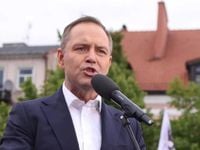In the latest poll conducted by the Pollster Institute for the Polish newspaper Super Express, support for the leading candidates in the presidential race has shifted significantly. Rafał Trzaskowski, representing Koalicja Obywatelska, now commands 32.26% of the vote, reflecting a decrease of 0.7 percentage points from the end of April 2025. Meanwhile, the gap between Trzaskowski and his closest rival, Karol Nawrocki, has widened to nearly 10 percentage points. Nawrocki, backed by the ruling party PiS, currently holds 22.70% support, down by 2.3 percentage points from the previous poll.
The latest survey results show Sławomir Mentzen, the candidate from the Confederation party, at 13.58%, which marks a decline of 1.4 percentage points. Following him are Szymon Hołownia, the Speaker of the Sejm, with 8.36% (an increase of 1.36 percentage points), and Adrian Zandberg from the Razem party, securing 7.21% (up by 1.21 percentage points). Magdalena Biejat from Nowa Lewica garnered 5.52% (a rise of 1.52 percentage points), while Grzegorz Braun from the Confederation Korony Polskiej received 5.30% (up by 1.4 percentage points). Other candidates, including Krzysztof Stanowski and Joanna Senyszyn, received 2.03% and 1.42% respectively.
Among the lesser-known candidates, Marek Jakubiak received 0.89% (-0.11 percentage points), Artur Bartoszewicz 0.66% (-1.34 percentage points), and Maciej Maciak only 0.07% (-0.93 percentage points). This poll was conducted between May 7-8, 2025, with a sample size of 1,077 Polish adults.
Interestingly, a separate Pollster survey reveals that 52% of respondents believe that the ongoing housing issue surrounding Nawrocki will negatively impact his electoral prospects. Only 30% disagreed with this assessment, while the remainder were undecided or unaware of the controversy regarding a small apartment in Gdańsk linked to Nawrocki. This issue appears to resonate even among PiS supporters, with 23% asserting that it will affect the presidential election results, while 66% of PiS voters do not think it will have any significant impact.
The first round of the presidential election is set for May 18, 2025, with a potential second round scheduled for June 1, 2025. The shifting dynamics in public opinion highlight the increasing stakes as candidates ramp up their campaigns in the lead-up to the elections.
According to the Pollster Institute, the recent poll indicates a surprising change compared to the previous survey released at the end of April. Just a week ago, Nawrocki was perceived to have a better chance of defeating Trzaskowski, with earlier polls showing Trzaskowski at 33% and Nawrocki at 25%. Now, with Trzaskowski leading at 32% and Nawrocki falling to 23%, the momentum seems to be shifting.
This downward trend for Nawrocki raises questions about the impact of the so-called "housing affair" on his campaign. The controversy surrounding his real estate dealings has sparked discussions among voters, and it seems to be a pivotal issue in the minds of many. As the election date approaches, how candidates address such controversies could prove critical in swaying undecided voters.
In terms of overall public sentiment, the Pollster survey reflects a nuanced landscape. Trzaskowski's slight decline in support, juxtaposed with Nawrocki's more significant drop, suggests that while Trzaskowski may be losing ground, Nawrocki's challenges are more pronounced. As the campaign progresses, candidates will need to navigate these waters carefully to maintain or regain support.
Additionally, the poll results indicate that Sławomir Mentzen continues to hold a steady position, although he too has seen a decline in support. The remaining candidates, including Hołownia, Zandberg, Biejat, and Braun, are vying for a larger share of the vote as they seek to capitalize on any missteps by the leading candidates.
As the electoral landscape evolves, it remains to be seen how the candidates will adapt their strategies in response to these polling trends. With the first round of voting just days away, the urgency to connect with voters and address pressing issues will be paramount.
In conclusion, the Pollster Institute's latest findings highlight a crucial moment in Poland's presidential race. As candidates gear up for the upcoming elections, the implications of these polls could significantly influence their strategies and outreach efforts. The electorate's sentiments, particularly concerning the housing controversy, will likely play a decisive role in shaping the outcome of this election.

